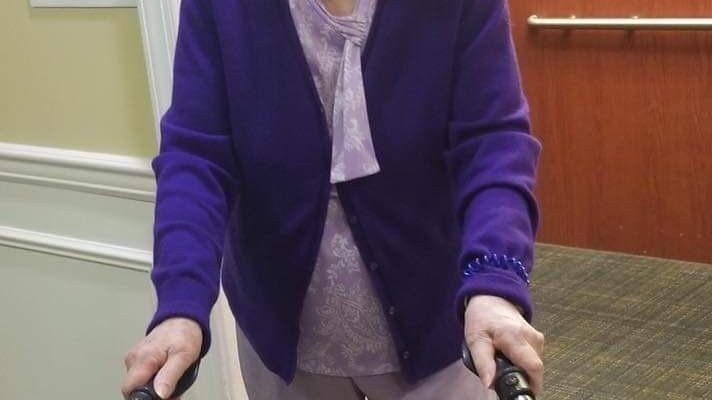The hardest part wasn’t packing up her things. It wasn’t signing the paperwork or walking through those beige, too-quiet halls. It was when she smiled at me and said, “You don’t have to visit every day, sweetheart. I’ll be just fine.”
She said it like she believed it. Like she was trying to make me feel better.
We all agreed it was time. Mom’s memory had started to slip—little things at first, like forgetting if she’d eaten or where she put her purse. Then she wandered out of the house in the middle of the night and the neighbor found her in her robe, barefoot, asking where Dad went. Dad’s been gone eight years.
It wasn’t safe anymore. My sister Salome and I both work full-time, and we have our own kids to take care of. We tried rotating days, hiring a caregiver, but Mom kept firing people. Said she didn’t want “a stranger giving her a bath.”
The nursing home isn’t bad, honestly. Clean place, kind staff, nice courtyard with a bird feeder she likes to watch. But the minute we left her room, I felt this horrible lump in my throat. Like we’d just abandoned her.
In the car, Salome didn’t say much. She just stared out the window and picked at her nail polish.
“I feel like we’re giving up on her,” I finally said.
“We’re not,” she mumbled, but her voice cracked a little. “We’re just… out of options.”
That night, I couldn’t sleep. I kept thinking about Mom brushing my hair when I was little, humming old songs while she packed my lunch. Now I’d left her in a room with a plastic mattress and a call button she probably won’t remember to press.
Then the phone rang. 6:47 a.m.
It was the nursing home.
My heart dropped. I picked up on the second ring. “This is Camilla.”
“Hi, Ms. Rocha. This is Carla from Evergreen Oaks. I just wanted to let you know your mom’s fine—she’s okay—but she had a little scare this morning.”
I sat up straight in bed, the blankets suddenly too heavy. “What kind of scare?”
“She got confused and thought she was going to work. She made it out the front door before we noticed. She was trying to get to the bus stop down the street.”
I blinked. “She hasn’t worked in twenty years.”
“I know. We’ve updated her chart to flag this kind of wandering. She’s not hurt. Just… shaken up. So were we.”
I thanked Carla, hung up, and just sat there. It wasn’t even 7 a.m. and I already felt like crying. Again.
When I told Salome later, she didn’t say much. Just pressed her lips together and nodded. But the next afternoon, she was at the nursing home before I could even leave work. I showed up with some of Mom’s old scarves and crossword books and found Salome combing Mom’s hair, chatting like everything was normal.
Mom looked up and smiled when I walked in. “Oh, you brought my favorite one,” she said, reaching for a silk scarf she used to wear to church. I smiled, but inside I was breaking. How long would she even remember that was her favorite?
Days passed. We started visiting more often than we expected. At first it was out of guilt, I won’t lie. But then, it became habit. Mom had her moods—some days she was sharp, told us stories from her childhood we’d never even heard before. Other days, she’d ask where Dad was and cry when we reminded her. Those days were the worst.
One afternoon, something unexpected happened. We were visiting during bingo—Salome, the kids, and me. I saw a woman sitting next to Mom, laughing with her, touching her arm gently. She looked around my age.
“Who’s that?” I whispered to Carla, one of the nurses.
“That’s Renata. Her mom’s down the hall. She visits a lot and kind of… adopted your mom a little.”
I walked over and introduced myself. Renata smiled kindly. “Your mom’s sweet. She reminds me of my aunt.”
Over the next few weeks, Renata and I started talking more. We swapped coffee runs, traded stories, even cried once in the parking lot after a rough day. Somehow, this stranger became part of my support system.
And then, out of nowhere, Mom had a really good week. She remembered Salome’s birthday, sang half a song we hadn’t heard in years, even teased my son about his missing front tooth.
I realized then—it wasn’t perfect, but it wasn’t all loss either.
One Saturday, we brought some of Mom’s old photo albums to the courtyard. She pointed at a picture of her and Dad dancing and said, “He stepped on my toes all night. But he looked so handsome, I didn’t care.”
I felt the guilt shift. Not disappear—but soften.
That day, as we walked back to the car, Salome stopped and said, “Maybe this isn’t giving up. Maybe it’s… loving her in a new way.”
And she was right.
We didn’t abandon Mom. We adjusted. We kept showing up. We found help, found community, found strength we didn’t know we had.
If you’re going through something like this—please know: doing what’s best doesn’t always feel good. But that doesn’t mean it’s wrong.
You can carry love and grief at the same time.
And you don’t have to carry it alone.
If this story touched you, share it. Someone else might need to read it today.
Drop a comment below if you’ve been through something similar. Let’s talk.



